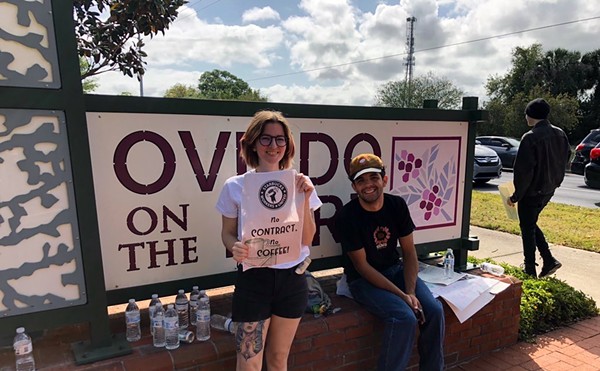I found myself in a haze on a recent Saturday morning – go figure – and, very much to my surprise, watching C-Span. I'm admittedly a political junkie, but I make it a point to avoid the monotone babblefest that C-Span offers out of consideration for my own sanity.
The show was Washington Journal, which features interviews and viewer call-ins with political bigs. On that particular Sunday morning the guest was John Alford, a political scientist at Rice University. And it was Alford who made me choose Advil over my remote control, because he was waxing on an idea that had never before crossed my mind: Politics are genetic.
We know that genes play at least some role in everything we are – our eye color and height, for instance. So is it such a stretch to imagine that our political bent is determined by DNA?
Not at all, according to Alford, who studied fraternal and identical twins in Virginia for a May 2005 article in the American Political Science Review.
OW: Please give us a little background on how your research was conducted, and what you discovered.
Alford: We were interested in the widening field of behaviors that have shown some genetic predictability. … There's some early work both in the U.S. and Australia that linked things that appeared to be kind of basic political attitudes … with notions of social liberalism or conservatism, things like whether people approved of certain moral practices, `such as` open marriage `and those` sorts of things. That intrigued us. … And we know, for example, that our religious denomination is heavily influenced by the religious denomination of our parents. We know the same thing is true of our party identification – that children typically, if both parents have a strong shared party identification, their children typically have a similar lifelong party identification. What we haven't been able to find in parent-child studies is any very strong indication of how people develop lifelong attitudinal traits like conservatism or liberalism. … What that led us to was the standard methodology in behavioral genetics, which is, rather than studying parents and children you actually just study `identical and fraternal` twins and compare the two. … If a trait is genetic, it will show up as basically twice as similar in adulthood in identical twins as it is in nonidentical twins. And that's how we found both for specific attitudes that we think of as conservative or liberal and for a general scale of conservatism and liberalism. … `So` what we're seeing there is exactly the pattern we would expect, where a party ID is almost entirely given to you by your parents or by some individual experiences you have later in life, and on the contrary, ideology `has` almost no parental influence at all. There is substantial influence for life experience. I think one thing not to think is that this is kind of genetic determinism.
OW: If somebody is genetically predisposed to be liberal, does that mean that they are more likely to oppose the death penalty or be pro-choice out of the gate? How does that work?
Alford: That's a really good question, because it's something that a lot of people miss. Because you see these gut responses to these issues hitting that way, there is this tendency to think that there is something like a gene for the death penalty. … We strongly suspect, given the pattern we find, that there are multiple genes involved, and that they involve some very different kinds of traits, including a kind of a tendency towards a very rule-based behavior, to not like exceptions to rules. … So I think there are some things that, as you say, right out of the box tend to break liberal or conservative. They tend to be kind of general predispositions and not specific issue determinants. I think what creates those gut-level reactions to specific issues is the way in a particular culture and a particular time those issues are being defined in political discussion. …
The real key is, if you think about two ways to kind of sell an issue, you can sell in a kind of intellectual way … `but` the truth is for most people, there's a gut-level reaction that's probably more important than an intellectual one. … Ronald Reagan liked to put up his charts too, but he didn't put them up to make a deep intellectual argument, he put them up to tap that gut-level reaction people had. He just said, "The Soviet Union is an evil empire and I'm not gonna go through the whole discussion about why Marxism is a failure in modern society." … There are certain messages that not only appeal intellectually to conservatives or liberals but appeal emotionally to them. When you hit right on that, the thing that has both the emotional and the intellectual appeal, then it is very difficult for them to be moved off of that position. In fact, if you argue long enough with them, they'll lose the intellectual facade and just say, "Because it's right and you're wrong."
OW: I'm a pretty well bona fide liberal, and yet both of my parents are conservative. Genetically, how is this possible? And were I to mate with another liberal, does that increase the chances that my children would be libs?
Alford: You've got two really good questions. The first is what several people refer to in discussions as the Alex Keaton phenomenon, referring back to the TV show `Family Ties` where the parents really do look at the offspring and constantly ask each other, "Where did this kid come from?"… So we tend to see this most dramatically not when it works the way it typically works – most of the time two liberal parents would have liberal offspring. … `B`ut when we see the opposite, the exception, the thing that doesn't occur as often, then it's dramatic and it really makes us think seriously about it. What you have to remember, this is like any other genetic trait. … You can get substantial variation across generations. So assuming it takes several genes that all have to be in the same place for someone to be strongly liberal, part of what is going on is this chance mixing of your mother and father's genetic material, and sometimes that produces something that is quite distinct from the two parents. ...
On the other hand, the likelihood of that happening decreases the more alike your parents' ideology is. … If you mate with someone who is also dominantly liberal than chances are more likely than not that your kids will be liberal. … `T`he normal assumption in mating is that mating takes place without regard to genetic traits, and that every pair of parents basically share 50 percent of their genetic material. On some traits, there is a tendency for people to mate predominantly with people like them. And it's very clear for these political traits that liberals are much more likely to mate with liberals and conservatives with conservatives. And that means that this mixing – at the extremes particularly – there's not much of this mixing taking place.
OW: What about moderates?
Alford: `T`he tendency in politics is to treat moderates as people who somehow either don't have an ideology or `have` a random mix of liberalism and conservatism. My beliefs, based on the previous work I've seen … is that moderates are as much a genetic type as strong liberals and conservatives and that it isn't just that they're somehow lost in the middle, that they really do have a predisposition towards some things that ideologues don't. Ideologues, for example … don't like compromise. They both react badly to compromise as unprincipled. … It's really only moderates that are predisposed to see politics as something we can all agree on.
OW: What are the implications of your findings, and what role do you believe they'll play in the American politics of the future?
Alford: Much of what is prescriptive about this has already found its way into modern politics. Another way of thinking about it is that modern politics has evolved, and by natural selection the techniques that work are there, and those that don't aren't. But I think it informs some of those things, so that in modern campaigns there's been a movement away from the idea that what you want to do is change the minds of your opponents. … Elections are really about managing turnout, which means they're about managing how motivated people get.
If there is a single outcome that people would take home from this, I hope `it's` that when you're discussing politics with someone who really has a very different deep-seated belief, that you just have to step back for a second and remind yourself that their belief comes from something that was built into them, something that was there at birth and is not going away, and that they're not willfully, intellectually blocking your superior set of arguments. … I think for liberals it means the recognition that conservatives can be perfectly decent people even though they view the world in a way that we would like to think reflects a willful hard-headedness. And for conservatives it means that liberals can be good people even if liberals just simply don't get it when it comes to the importance of rule adherence and things like that. … Just that appreciation that when moderates can appreciate when liberals and conservatives actually come together and `former presidents George H.W. Bush and Bill Clinton` get together and do tsunami relief, that when they actually sit down at the table and can agree to agree on something, that's not just nontrivial. That really reflects something that's a real accomplishment, a real ability to work hard and overcome a predisposition.


















